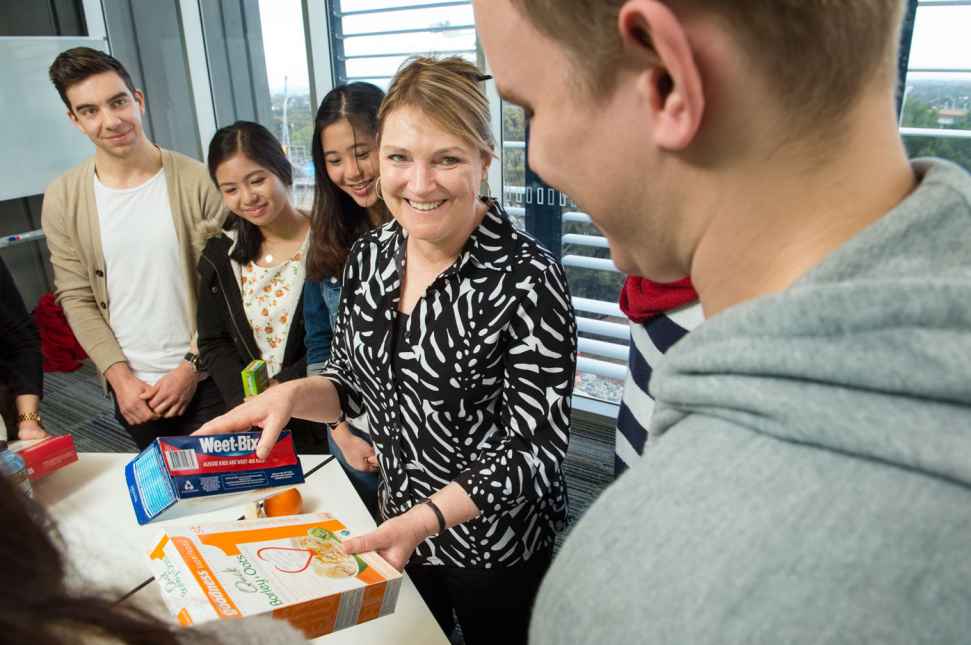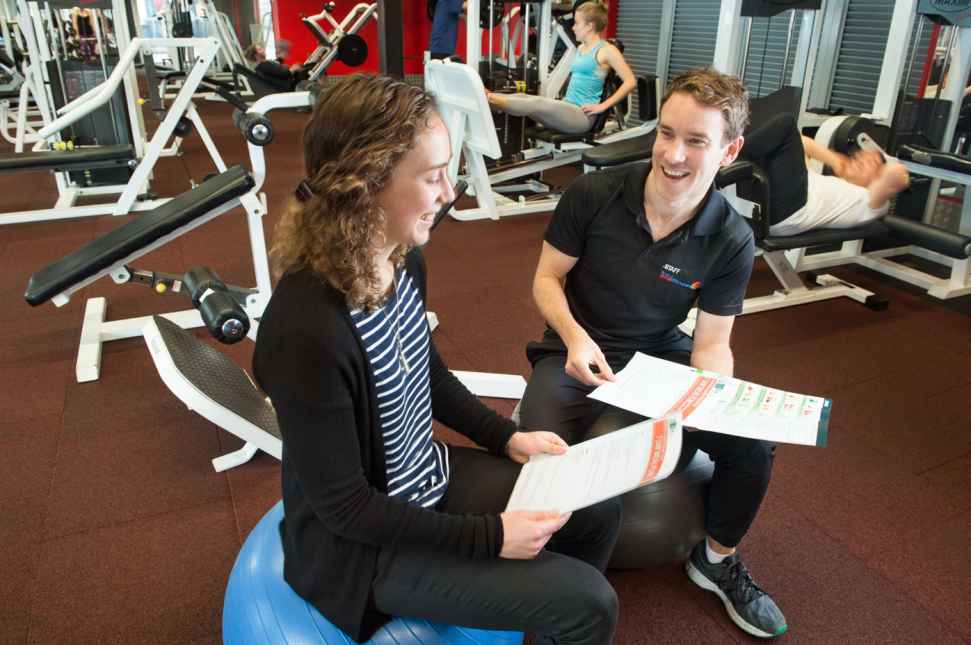Transform the community’s health through nutrition
If you are interested in taking your passion for healthy eating and turning it into your career, then the Bachelor of Human Nutrition is a great place to start.
Our degree is designed with you in mind. We have partnered our commitment to nutrition with scientifically backed information to give you the knowledge and skills required for a qualification in the changing and expanding area of nutrition.
On completion of the course, graduates may apply for membership and registration as an Associate Nutritionist (ANutr) with the Nutrition Society of Australia (Inc).
Want to combine science, nutrition and exercise into a career?
If you are equally passionate about nutrition and exercise as a career, another new course combines the two new degrees into the Bachelor of Human Nutrition, Bachelor of Exercise Science (combined degree).
Courses
Bachelor of Human Nutrition/Bachelor of Exercise Science
If you are equally passionate about nutrition and exercise as a career, you can combine the Bachelor of Human Nutrition with the Bachelor of Exercise Science.
What you will study
The Bachelor Human Nutrition will offer you the opportunity to study nutritional, health and medical sciences so you can promote evidence-based nutrition and prevent illness in communities and in individuals.
BIOL1102 – Molecular Basis of Life (4.5 units)
CHEM1202 – Chemistry for the Life Sciences (4.5 units)
HLTH1003 – Legal and Ethical Aspects of Health Care (4.5 units)
HLTH1004 – Human Bioscience (4.5 units)
NUTD1105 – Food Systems (4.5 units)
NUTD1106 – Nutrition, Physical Activity and Health (4.5 units)
Plus one of:
CHEM1101 – Chemical Structure and Bonding (4.5 units)
CHEM1201 – General Chemistry (4.5 units)
Plus 4.5 units chosen from the option topics listed below. Students are encouraged to select the following topic:
NUTD1101 – The Australian Table: An Introduction to Food and Food Culture (4.5 units)
BIOL2771 – Biochemistry (4.5 units)
HLTH2102 – Indigenous Health for Health Sciences (4.5 units)
MMED2931 – Human Physiology (4.5 units)
MMED2932 – Integrative Human Physiology (4.5 units)
MMED3933 – Biochemistry of Human Disease (4.5 units)
NUTD2101 – Nutrition Across the Lifecycle (4.5 units)
NUTD2102 – Food Products and Preparation (4.5 units)
NUTD2105 – Individual, Social and Environmental Perspectives on Food Consumption (4.5 units)
HLTH2105 – Health: A Psychological Perspective (4.5 units)
HLTH3102 – Qualitative Methods for Social Health Research (4.5 units)
HLTH3105 – Quantitative Methods for Social Health Research (4.5 units)
NUTD3101 – Fundamentals of Nutritional Epidemiology (4.5 units)
NUTD3102 – Nutrients Role and Function (4.5 units)
NUTD3107 – Public Health and Community Nutrition (4.5 units)
NUTD3203 – Nutrition for Sports Performance (4.5 units)
Plus 4.5 units of elective topics chosen from any topic offered by the University provided topic prerequisites are met.
Students are encouraged to select one of the following topics as their elective:
NUTD3110 – Independent Studies in Nutrition and Dietetics (4.5 units)
Enterprise 1001 – (New Ventures Institute New Topic) (4.5 units)
NUTD1101 – The Australian Table – An Introduction to Food and Food Cultures (4.5 units)
NUTD3110 – Independent Studies in Nutrition and Dietetics (4.5 units)
NUTD3111 – Independent Studies in Nutrition and Dietetics (9 units)
DSRS1202 – Lifespan Development (4.5 units)
DSRS1206 – Health Issues and Disability (4.5 units)
DSRS1209 – Human Diversity (4.5 units)
DSRS1210 – Interpersonal and Group Skills (4.5 units)
ESOL1101 – English as a Second Language 1 (4.5 units) International students only
HLTH1101 – Health Promotion for Health Professionals (4.5 units)
HLTH1305 – Health Practitioner Practice 1 (4.5 units)
HLTH1306 – Health Practitioner Practice 2 (4.5 units)
MMED1005 – How Your Body Works: Human Physiology and Structure (4.5 units)
PSYC1101 – Psychology 1A (4.5 units)
PSYC1102 – Psychology 1B (4.5 units)
or other topic approved by the course coordinator
To qualify for The Bachelor of Human Nutrition, you need to complete 108 units with a grade of P or NGP or better in each topic, according to the program of study.
Learn from our experts
Our experienced teaching staff includes Advanced Accredited Practising Dietitians and staff with PhDs in the field of nutrition and dietetics. Many come from working as practioners and have strong partnerships with industry, including the nutrition and the sports industry, and potential employers.
Teaching staff from other disciplines are also highly experienced with strong track records in relevant research and prepare you to work in a multidisciplinary and evolving field.
Our nutrition training is at the forefront of nutrition and dietetic education and research in Australia and overseas, recently gaining five years of full accreditation (no conditions) with the Dietitians Association of Australia.
Our research was also ranked above world standard in the most recent Excellence in Research for Australia rankings.
Further study pathways
The Bachelor of Human Nutrition enables pathways of study within nutrition and other disciplines including education, medicine and public health plus continuation into higher research degrees.
Bachelor of Human Nutrition students will obtain the required prerequisites to apply for lateral transfer to the Bachelor of Nutrition and Dietetics on completion of two years (72 units).
Bachelor of Human Nutrition graduates will also be eligible to apply for entry to the Master of Nutrition and Dietetics, Master of Public Health, Master of Teaching (Secondary) and the Graduate Medical Program.
The qualification
The Bachelor of Human Nutrition gives you the theoretical and practical knowledge to practice as an Associate Nutritionist (ANutr) on graduation and membership with the Nutrition Society of Australia (Inc). With experience graduates will be eligible to apply for registration as a Registered Nutritionist.


Why study human nutrition?
- Gain a qualification and competitive advantage in an emerging and expanding area that is still largely unqualified in the workforce.
- Be prepared to deliver quality preventative nutritional practice within a wide range of settings that includes nutrition, public health, health education or health promotion.
- Learn from experts in the field.
- Choose from specialisations in entrepreneurial venture, health promotion, behavioural sciences, nutrition sports science, public health or allied health.
- Obtain the required pre-requisites to apply for transfer to the Bachelor of Nutrition and Dietetics on completion of two years or apply for the Masters Nutrition and Dietetics.
- Increase your options as a graduate for further qualifications in allied health.
Careers
Possible careers:
- Registered Nutritionist
- Consultant Nutritionist
- Food Company Nutritionist
- Health Promotion or Lifestyle Officer
- Nutrition Health Coach
- Sports Nutrition Consultant
- Research Nutritionist
Possible employers:
- Local governments (councils)
- SA Health
- Non-government organisations (eg Heart Foundation, Red Cross, United Care Wesley)
- Community health services
- Food companies (health promotion)
- Corporations (research and development)
- Workplaces
- Health related businesses
- Media (including social media)
Continuation into postgraduate courses prepares you for additional careers as Dietitians, specialised Teachers, Public Health Officers, Medical Doctors and more.
How to apply
All undergraduate applications are made through the South Australian Tertiary Admissions Centre (SATAC).


